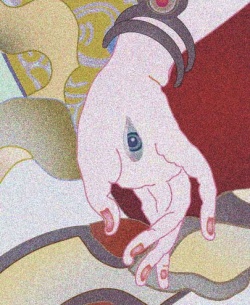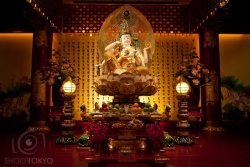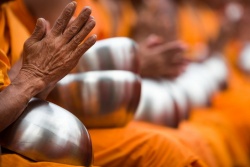Difference between revisions of "Four Fundamental Elements"
| (3 intermediate revisions by 2 users not shown) | |||
| Line 1: | Line 1: | ||
{{DisplayImages|939|1537|2351}} | {{DisplayImages|939|1537|2351}} | ||
<poem> | <poem> | ||
| − | 1. [[Pathavi | + | 1. [[Pathavi Dhatu]] |
| − | The [[earth element]] is also called [[element]] of {{Wiki|solidity}}. The [[earth]] as a foundation supports all other things. Due to its {{Wiki|hardness}}, firmness and strength it is called [[pathavi]]. The [[earth]], rocks, stones, masses of metals are all {{Wiki|matter}} in which the [[pathavi dhatu]] is dominant. | + | The [[earth element]] is also called [[element]] of {{Wiki|solidity}}]]. The [[earth]] as a foundation supports all other things. Due to its {{Wiki|hardness}}, {{Wiki|firmness}} and strength it is called [[pathavi]]. The [[earth]], rocks, stones, masses of metals are all {{Wiki|matter}} in which the [[pathavi dhatu]] is dominant. |
| − | 2. [[Apo | + | 2. [[Apo Dhatu]] |
Just as [[water]] enhances the cohesion of dust or powdered materials so also [[apo dhatu]], the [[element]] of cohesion, makes [[aggregates]] of tiny {{Wiki|particles}}. When [[apo dhatu]] is dominant, it can dissolve other [[elements]] and become fluid. [[Water]], {{Wiki|urine}}, mucus, {{Wiki|sweat}}, saliva, {{Wiki|tears}}, etc. are material dominated by [[apo dhatu]]. | Just as [[water]] enhances the cohesion of dust or powdered materials so also [[apo dhatu]], the [[element]] of cohesion, makes [[aggregates]] of tiny {{Wiki|particles}}. When [[apo dhatu]] is dominant, it can dissolve other [[elements]] and become fluid. [[Water]], {{Wiki|urine}}, mucus, {{Wiki|sweat}}, saliva, {{Wiki|tears}}, etc. are material dominated by [[apo dhatu]]. | ||
| − | 3. [[Tejo | + | 3. [[Tejo Dhatu]] |
Just as heat of the {{Wiki|sun}} can dry wet things, so also the [[tejo]] [[element]] prevents excessive dampness and {{Wiki|viscosity}} of [[aggregate]] {{Wiki|matter}} and maintains optimum dryness. The [[body]] of a healthy [[person]] is usually cool in the summer. This coolness also [[tejo dhatu]]. | Just as heat of the {{Wiki|sun}} can dry wet things, so also the [[tejo]] [[element]] prevents excessive dampness and {{Wiki|viscosity}} of [[aggregate]] {{Wiki|matter}} and maintains optimum dryness. The [[body]] of a healthy [[person]] is usually cool in the summer. This coolness also [[tejo dhatu]]. | ||
| Line 30: | Line 30: | ||
[[Kucchittha]]: [[Wind]] that moves about in the visceral cavity apart from the large and small {{Wiki|intestines}}. | [[Kucchittha]]: [[Wind]] that moves about in the visceral cavity apart from the large and small {{Wiki|intestines}}. | ||
[[Kotthasaya]]: [[Wind]] that moves about inside the large and small {{Wiki|intestines}}, pushing digestible [[food]] from the {{Wiki|stomach}} into the {{Wiki|rectum}}. | [[Kotthasaya]]: [[Wind]] that moves about inside the large and small {{Wiki|intestines}}, pushing digestible [[food]] from the {{Wiki|stomach}} into the {{Wiki|rectum}}. | ||
| − | [[Anggamanganusari]]: [[Wind]] that moves within the limbs. If this [[wind]] does not move freely {{Wiki|illness}} results. In our [[bodies]] there are small veins along which this [[wind]] moves. Staying in one [[posture]] for a long [[time]] prevents this [[wind]] from moving freely causing {{Wiki|blood}} to accumulate at one location without flowing freely leading to stiffness and [[pain]]. To prevent this ailment, we should avoid remaining in one [[posture]] for a long [[time]]; and take walking exercise. | + | [[Anggamanganusari]]: [[Wind]] that moves within the limbs. If this [[wind]] does not move freely {{Wiki|illness}} results. In our [[bodies]] there are small veins along which this [[wind]] moves. Staying in one [[posture]] for a long [[time]] prevents this [[wind]] from moving freely causing {{Wiki|blood}} to [[accumulate]] at one location without flowing freely leading to stiffness and [[pain]]. To prevent this ailment, we should avoid remaining in one [[posture]] for a long [[time]]; and take walking exercise. |
[[Assasapassasa]]: [[Wind]] inhaled and exhaled by us. It is also known as [[anapana]]. | [[Assasapassasa]]: [[Wind]] inhaled and exhaled by us. It is also known as [[anapana]]. | ||
| Line 37: | Line 37: | ||
The four fundamental [[elements]] [[pathavi]], [[tejo]], [[vayo]] and [[apo]] are basic {{Wiki|matter}} while other associated {{Wiki|matter}} are secondary. The four fundamental [[elements]] serve as foundation for the secondary {{Wiki|matter}}. If the [[aggregate]] of the four [[dhatus]] are immense, we have big [[inorganic]] masses such s high [[mountains]], big fires and immense living {{Wiki|organisms}} such as big [[Devas]], big fishes. The larger the [[aggregate]] of the four fundamental [[dhatus]], the bigger the size of the living or non-living thing. | The four fundamental [[elements]] [[pathavi]], [[tejo]], [[vayo]] and [[apo]] are basic {{Wiki|matter}} while other associated {{Wiki|matter}} are secondary. The four fundamental [[elements]] serve as foundation for the secondary {{Wiki|matter}}. If the [[aggregate]] of the four [[dhatus]] are immense, we have big [[inorganic]] masses such s high [[mountains]], big fires and immense living {{Wiki|organisms}} such as big [[Devas]], big fishes. The larger the [[aggregate]] of the four fundamental [[dhatus]], the bigger the size of the living or non-living thing. | ||
| − | Other [[pasada rupa]] are secondary {{Wiki|matter}}. They do not grow in size. [[Sense-objects]] such as [[sight]], [[sound]], {{Wiki|smell}}, [[appearances]] are included in the class of secondary {{Wiki|matter}}. For example if you add mare scent to a cake of soap, it does not reduced the scent in the cake of soap, the [[aroma]] {{Wiki|diminishes}} but the size remains the same. So we must remember that only the four fundamental [[dhatu]] are basic {{Wiki|matter}}. | + | Other [[pasada rupa]] are secondary {{Wiki|matter}}. They do not grow in size. [[Sense-objects]] such as [[sight]], [[sound]], {{Wiki|smell}}, [[appearances]] are included in the class of secondary {{Wiki|matter}}. For example if you add mare {{Wiki|scent}} to a cake of soap, it does not reduced the {{Wiki|scent}} in the cake of soap, the [[aroma]] {{Wiki|diminishes}} but the size remains the same. So we must remember that only the four fundamental [[dhatu]] are basic {{Wiki|matter}}. |
</poem> | </poem> | ||
{{R}} | {{R}} | ||
[http://www.wisdomlib.org/buddhism/book/abhidhamma-in-daily-life_2/d/doc3185.html www.wisdomlib.org] | [http://www.wisdomlib.org/buddhism/book/abhidhamma-in-daily-life_2/d/doc3185.html www.wisdomlib.org] | ||
[[Category:Element's]] | [[Category:Element's]] | ||
| + | [[Category:Rupa]]{{BuddhismbyNumber}} | ||
Latest revision as of 15:22, 1 September 2014
1. Pathavi Dhatu
The earth element is also called element of solidity]]. The earth as a foundation supports all other things. Due to its hardness, firmness and strength it is called pathavi. The earth, rocks, stones, masses of metals are all matter in which the pathavi dhatu is dominant.
2. Apo Dhatu
Just as water enhances the cohesion of dust or powdered materials so also apo dhatu, the element of cohesion, makes aggregates of tiny particles. When apo dhatu is dominant, it can dissolve other elements and become fluid. Water, urine, mucus, sweat, saliva, tears, etc. are material dominated by apo dhatu.
3. Tejo Dhatu
Just as heat of the sun can dry wet things, so also the tejo element prevents excessive dampness and viscosity of aggregate matter and maintains optimum dryness. The body of a healthy person is usually cool in the summer. This coolness also tejo dhatu.
There are thus two types of tejo and sita tejo. Utu (climate) is another name for rejo. When the body and environs are cool, sita tejo pervades the entire atmosphere. When hot, unha tejo does the same. If this tejo dhatu is hot when it should be hot and cool when it is the time for cool season, we have healthy climate. In our bodies if tejo is moderate we are healthy; if not we are sick; if in excess we die.
Therefore those who cannot adapt to the changing tejo should live with care. They should avoid traveling in intense heat or extreme cold; they should avoid eating very hot or very cold food. Water and ice are aggregate matter with excess of site tejo where as the sun fire of unha tejo.
Pacaka tejo dhatu: this type of tejo serves to digest our food. It originates from beneath the stomach. Powerful pacaka tejo helps digest the food eaten, but if it is feeble you cannot digest properly and get stomach disorder. In order to be healthy you need to eat tender digestible food.
4. Vayo Dhatu
Vayo dhatu is the element of motion. It is seen in the wind blowing about and pushing against things. This dhatu pushes or moves other aggregate matter.
In our body there are six types of wind: -
Uddhangama: Wind that moves upward, causing bleaching, coughing, sneezing and related illness. When we speak this wind moves constantly upwards and cause bowel discomfort. One should not speak with an empty stomach.
Adhogama: Wind that moves downward causing bowel movement and frequent motion.
Kucchittha: Wind that moves about in the visceral cavity apart from the large and small intestines.
Kotthasaya: Wind that moves about inside the large and small intestines, pushing digestible food from the stomach into the rectum.
Anggamanganusari: Wind that moves within the limbs. If this wind does not move freely illness results. In our bodies there are small veins along which this wind moves. Staying in one posture for a long time prevents this wind from moving freely causing blood to accumulate at one location without flowing freely leading to stiffness and pain. To prevent this ailment, we should avoid remaining in one posture for a long time; and take walking exercise.
Assasapassasa: Wind inhaled and exhaled by us. It is also known as anapana.
Basic And Secondary Matter
The four fundamental elements pathavi, tejo, vayo and apo are basic matter while other associated matter are secondary. The four fundamental elements serve as foundation for the secondary matter. If the aggregate of the four dhatus are immense, we have big inorganic masses such s high mountains, big fires and immense living organisms such as big Devas, big fishes. The larger the aggregate of the four fundamental dhatus, the bigger the size of the living or non-living thing.
Other pasada rupa are secondary matter. They do not grow in size. Sense-objects such as sight, sound, smell, appearances are included in the class of secondary matter. For example if you add mare scent to a cake of soap, it does not reduced the scent in the cake of soap, the aroma diminishes but the size remains the same. So we must remember that only the four fundamental dhatu are basic matter.


